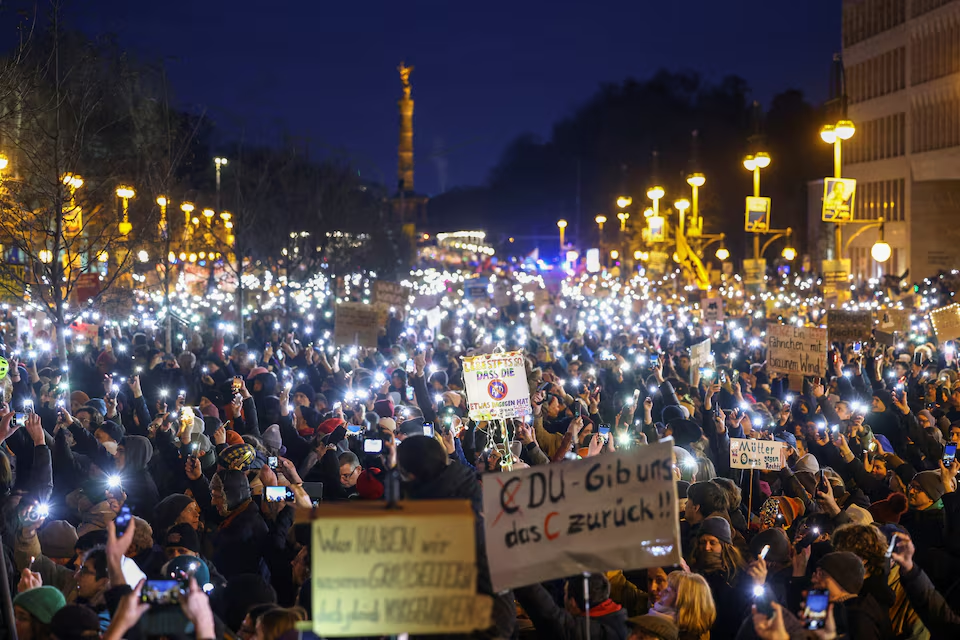In a powerful display of resistance, tens of thousands of people gathered in Berlin on Sunday to protest the German government’s controversial proposed immigration crackdown. This movement is sparked by a new draft bill supported by opposition conservatives and the far-right Alternative for Germany (AfD), led by Friedrich Merz. The protestors, estimated at 160,000 by Berlin police, rallied at the iconic Brandenburg Gate, near the Bundestag, expressing outrage over what they see as an unjust and exclusionary policy targeting immigrants.
The protestors held banners reading “We are the firewall, no cooperation with the AfD” and “Merz, go home, shame on you!”—voicing their opposition not only to the proposed immigration measures but also to the controversial alliance between Merz’s conservative CDU/CSU party and the AfD, a party under surveillance by German security services due to its extremist views. Merz, who is positioned to become Germany’s next chancellor following the national elections set for February 23, 2025, sponsored this immigration bill with AfD backing, breaking a long-standing political taboo against working with far-right parties. His move has deepened political divisions, triggering fierce backlash from both political opponents and his own party members.
The draft bill, which proposes restricting family reunifications for certain refugees and tightening border control measures, failed to gain support in the lower house of the Bundestag last week. Merz’s efforts to push the legislation through were thwarted when several deputies from his own party refused to back it. This failure has dealt a significant blow to Merz’s authority, particularly as he seeks to lead Germany in the upcoming elections.
Mainstream German political parties, including Chancellor Olaf Scholz’s Social Democrats (SPD) and the Greens, had previously united to prevent the AfD from gaining legislative power, establishing what they call a “firewall” against the far-right. Despite the growing support among some segments of the German public—two-thirds of whom favor stronger immigration regulations, according to a recent poll—many see this bill as an infringement on European law and a step too far in aligning with extremist factions.
Merz and his supporters argue that the bill is a necessary measure to address rising concerns over public safety, citing high-profile killings in public spaces by individuals with immigrant backgrounds. However, critics, including the SPD and Greens, contend that the bill would not prevent such incidents and would only fuel division and discrimination. Legal experts warn that the proposed legislation could violate European Union law, which guarantees the rights of refugees and immigrants.
The protests in Berlin are part of a broader national movement against the government’s proposed immigration policies. On Saturday, similar protests were held in cities across Germany, including Hamburg, Stuttgart, and Leipzig, where tens of thousands of people voiced their dissent against the coalition of CDU/CSU and the AfD. These demonstrations reflect the growing division within German society on the issue of immigration and the treatment of refugees.
As the February election draws nearer, the future of Germany’s immigration policies remains uncertain, with both supporters and critics of the crackdown gearing up for a fierce political battle. The protests highlight the deepening rift within the country over the balance between national security concerns and the protection of human rights.
This critical moment in German politics underscores the increasing polarization on immigration issues across Europe. It also brings to the forefront the tension between the desire for stricter immigration controls and the commitment to uphold European values of inclusivity and human dignity. With the potential for a significant shift in leadership, all eyes will be on Germany as it navigates these politically charged waters in the coming weeks.
Stay ahead with the latest news on global innovation, leadership, entrepreneurship, business, and technology. Join us on WhatsApp or Telegram for real-time updates on this and other critical stories. Have a report or article you’d like to share? Send it to report@theinnovationtimes.com.
Follow us on X (Twitter), Instagram, LinkedIn, YouTube, Pinterest, and Facebook for more insights, trends, and expert commentary.



